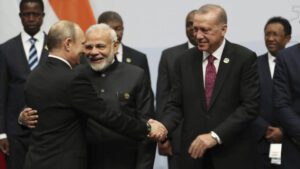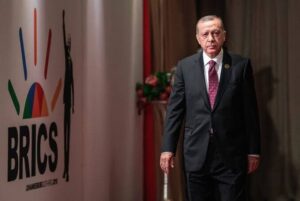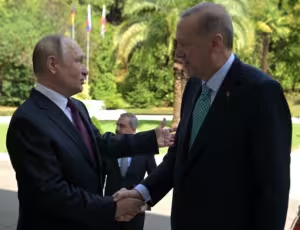Turkey has officially sought membership in the BRICS group of emerging-market nations, signaling a strategic pivot aimed at expanding its global influence and forging new international alliances. This move, spearheaded by President Recep Tayyip Erdogan’s administration, reflects Turkey’s ambition to align itself with a shifting geopolitical landscape increasingly centered around non-Western powers.
Turkey’s Strategic Shift

Straddling the intersection of Europe and Asia, Turkey’s application to join BRICS represents a significant departure from its longstanding focus on Western alliances. This bid comes amid a stalled accession process to the European Union (EU) and growing discontent within NATO, particularly following Turkey’s close relations with Russia since the latter’s invasion of Ukraine in 2022.
Erdogan’s administration has articulated a vision of Turkey as a bridge between East and West, aiming to bolster its economic and strategic positioning on the global stage. “Turkey can become a strong, prosperous, prestigious, and effective country if it improves its relations with the East and the West simultaneously,” Erdogan stated recently in Istanbul.
BRICS Expansion and Turkey’s Role

The BRICS grouping, which includes Brazil, Russia, India, China, and South Africa, is known for advocating alternatives to Western-dominated institutions such as the World Bank and International Monetary Fund. The recent expansion of BRICS, with new members Iran, the United Arab Emirates, Ethiopia, and Egypt joining earlier this year, underscores the group’s growing influence. Turkey’s potential inclusion would further amplify its role in global economic and political discourse.
BRICS members enjoy access to development financing and broader political and trade networks, opportunities that Turkey is keen to leverage. The country aims to enhance economic cooperation with Russia and China and position itself as a pivotal trade conduit between Europe and Asia. Turkey’s foreign policy is increasingly oriented towards establishing itself as a central hub for energy and trade, including aspirations to become a major gas export hub from Russia and Central Asia.
Balancing Act Between East and West

Despite its bid to join BRICS, Turkey is not abandoning its Western ties. The Erdogan administration continues to pursue its EU membership aspirations and engage with NATO allies, though these efforts face challenges due to perceived democratic shortcomings and geopolitical tensions. Turkey’s Foreign Minister Hakan Fidan emphasized that joining BRICS does not preclude continued engagement with the EU, highlighting a strategy of balancing relationships across different global forums.
Geopolitical and Economic Implications
Turkey’s BRICS bid is part of a broader strategy to diversify its international relationships and reduce reliance on Western powers. This move reflects a growing trend among countries to realign their foreign policies in response to shifting global power dynamics. With BRICS poised to further expand its influence, Turkey’s inclusion could reshape regional and global economic interactions, offering new opportunities for trade and investment.
As the geopolitical landscape evolves, Turkey’s application to BRICS underscores its strategic intent to enhance its global presence and influence through diversified international partnerships. The outcome of its bid will be closely watched as it could mark a significant shift in Turkey’s foreign policy and its role in the emerging multipolar world order.
Related stories
BRICS Nation Officially Enters Top 5 Global Economies in Notable Shift
BRICS Officially Announces Financial System Similar to SWIFT
BRICS Unites Against Israel’s Gaza Offensive: Global Powers Demand Ceasefire
















